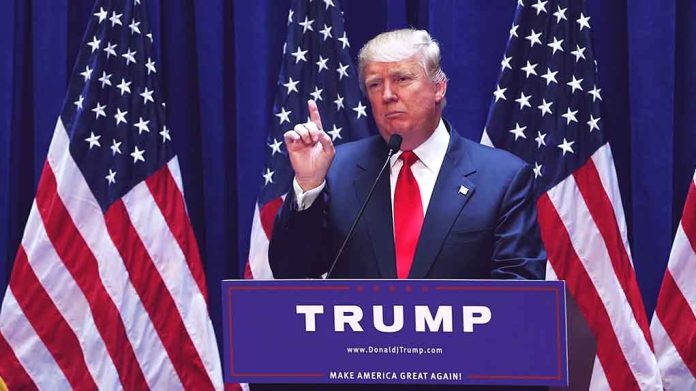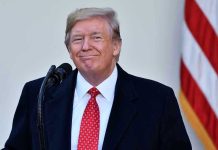
President Trump’s latest strike against Mexican cartels brings hope to grieving mother Anne Fundner, who lost her son to fentanyl poisoning.
Key Takeaways
- The Trump administration has sanctioned two high-level members of Cartel del Noreste, blocking all their U.S. assets and properties
- Treasury Secretary Scott Bessent emphasized using all available tools to target drug cartels and foreign terrorist organizations to “Make America Safe Again.”
- Anne Fundner, who lost her son to fentanyl, praised the sanctions as sending a “very strong message” to the cartels
- Cartel del Noreste is recognized as one of Mexico’s most violent drug-trafficking organizations, involved in fentanyl trafficking into the U.S.
- Border Patrol officials confirm these actions fulfill Trump’s promise to prevent cartels from operating with impunity near U.S. borders
Trump Administration Targets Cartel Leadership
The Treasury Department announced Wednesday that sanctions have been imposed on two high-level members of the Mexican Cartel del Noreste. The targeted individuals, Miguel Angel de Anda Ledezma and Ricardo Gonzalez Sauceda, are key figures in the cartel’s drug and arms trafficking operations. This decisive action comes as part of President Trump’s broader strategy to combat the fentanyl crisis that has devastated American communities. The sanctions effectively block all U.S. properties and interests belonging to these cartel leaders, striking directly at their financial operations.
Treasury Secretary Scott Bessent emphasized the administration’s commitment to fighting drug cartels, stating they “will continue to use all available tools to relentlessly target drug cartels and foreign terrorist organizations to Make America Safe Again.” This approach represents a significant escalation in efforts to disrupt the financial infrastructure that enables cartel operations across the U.S.-Mexico border. The sanctions are particularly focused on cartels’ fuel theft networks, which have caused substantial revenue losses for the Mexican government while funding fentanyl trafficking into the United States.
Derek Maltz Sr., a former agent of the Drug Enforcement Administration (DEA), has called for Mexican drug cartels to be held accountable for what he describes as "massive amounts" of American deaths. He suggests that these organizations should be treated as "Narco-Terrorist… pic.twitter.com/Aw6XoWrZvT
— Derek Maltz Sr (@derekmaltz_sr) November 23, 2024
A Mother’s Grief Turned to Action
Anne Fundner, who lost her son to fentanyl poisoning, has emerged as a powerful voice supporting the Trump administration’s actions against the cartels. “The Trump administration is targeting two high-level Mexican cartel members with sanctions, the Treasury Department announced Wednesday, in a move angel mom Anne Fundner calls a ‘very strong message,'” Fundner stated. Her tragedy has fueled her advocacy for stronger measures against the organizations responsible for trafficking deadly substances into American communities.
“President Trump’s actions against the cartels fulfill the promise that he made when he stated time and time again that he would not allow the cartels to operate with impunity on our borders or within the interior of the United States,” said Paul Perez, president of the National Border Patrol Council.
Fundner believes that Trump’s presidency is making a difference in the fight against fentanyl trafficking. The Cartel del Noreste, recognized as one of Mexico’s most violent drug-trafficking organizations, has been a primary target. Ricardo Gonzalez Sauceda, one of the sanctioned individuals, was arrested in February with fentanyl pills, methamphetamine, and firearms, highlighting the direct connection between these cartel leaders and the deadly substances flooding American streets.
Financial Warfare Against Cartels
The sanctions represent a strategic approach to combating cartel operations by targeting their financial resources. By freezing assets and prohibiting U.S. citizens from conducting business with these individuals and their associated entities, the Trump administration aims to severely restrict the cartels’ ability to fund their operations. Paul Anthony Perez explained that these measures “will ensure that the cartels no longer can provide unlimited funds to further their criminal enterprises and allow the U.S. government to disrupt their daily activities on both sides of the border.”
“The new sanctions deal a significant blow and serve to send the message to all cartels, as well as to those who wish to harm Americans, that President Trump will not just talk about it, he will follow through,” Perez said.
The administration’s approach extends beyond just the Cartel del Noreste. Similar sanctions have been imposed on the Jalisco New Generation Cartel, another powerful Mexican organization with approximately 19,000 members that became extremely violent after splitting from the Sinaloa cartel in 2010. The Jalisco cartel has been officially designated as a Foreign Terrorist Organization and Specially Designated Global Terrorist, reflecting the administration’s view that these cartels pose a national security threat on par with terrorist groups.
International Cooperation and Future Strategy
The White House has linked its fentanyl strategy to Trump’s broader tariff plan, which aims to hold Mexico, Canada, and China accountable for stopping drug flows into the United States. Mexican President Claudia Sheinbaum has discussed efforts to improve traceability of fuel shipments to combat theft and smuggling, stating: “So that any tanker truck carrying fuel, whichever kind, we know: where it came from; where it’s going; if it’s imported, with what import permit did it enter, where was it stored, and from there to which service station is it going to be taken.”
Time for Shapiro to Step Up and Protect Pennsylvanians with Border Security
Sen. Doug Mastriano (R-33)Amid an escalating crisis at the southern border, Pennsylvania has an opportunity to act decisively. Last summer, the Pennsylvania State Senate passed Senate Resolution 251,… pic.twitter.com/5poZ1qtopY
— Senator Doug Mastriano (@SenMastriano) January 27, 2025
Drug trafficking, especially fentanyl, has been a growing crisis, with significant seizures reported by Customs and Border Protection. The Trump administration’s sanctions represent one component of a multi-faceted approach to combat this threat. By targeting the financial infrastructure of cartels, disrupting their leadership, and working with international partners, the administration aims to reduce the flow of deadly drugs into American communities and prevent more families from experiencing the tragedy that Anne Fundner has endured.














